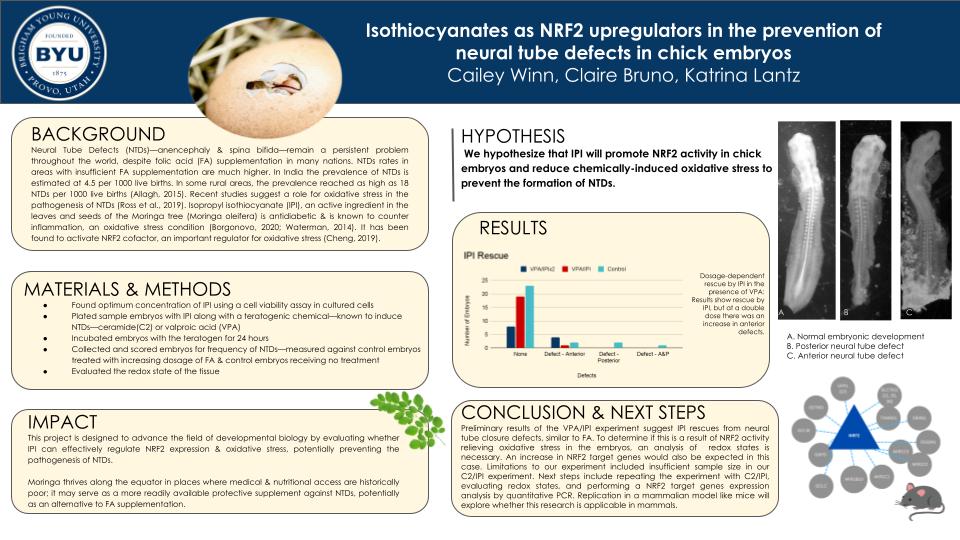Presenter Name: Katrina Lantz
Additional Presenters:
Claire Bruno (cebruno.2001@gmail.com), Cailey Winn (caileybaby@gmail.com)
Description
Neural Tube Defects (NTDs)—anencephaly and spina bifida—remain a persistent problem across the globe, despite folic acid (FA) supplementation in many nations. NTDs rates in areas with insufficient FA supplementation are higher. In India the prevalence of NTDs is estimated at 4.5 per 1000 live births. In some rural areas, the prevalence peaked at 18 NTDs per 1000 live births. Recent studies suggest a role for oxidative stress in the pathogenesis of NTDs. Isopropyl isothiocyanate (IPI), active ingredient in the leaves/seeds of the Moringa tree (Moringa oleifera) is a known antidiabetic compound countering inflammation, an oxidative stress condition. It is known to activate NRF2 cofactor, an important regulator for oxidative stress. We hypothesize IPI will promote NRF2 activity in chick embryos and reduce chemically-induced oxidative stress to prevent the formation of NTDs. Because Moringa thrives along the equator where medical and nutritional access are historically poor, if shown to be effective, it may increase access to protection from developmental insults in places without FA supplementation programs. Using a cell viability assay in cultured cells, the optimum concentration of IPI was determined. Chick embryos were pretreated or cotreated with IPI 6 hours before plating on chemicals known to induce NTDs—ceramide or valproic acid (VPA)—and left for 24 hours. Embryos were then collected, scored for frequency of NTDs, and measured against control embryos pretreated with increasing dosage of FA, which is known to rescue NTDs, and control embryos receiving no pretreatment. The redox state of the tissue was evaluated. NRF2 target gene expression analysis by quantitative PCR is planned. This project may advance the developmental biology field, ascertaining whether IPI effectively regulates NRF2 expression and oxidative stress, potentially preventing the pathogenesis of NTDs. Next steps include confirming results in the mammalian model to establish relevance to humans.
University / Institution: Brigham Young University
Type: Poster
Format: In Person
Presentation #A66
SESSION A (9:00-10:30AM)
Area of Research: Health & Medicine
Email: katrina.lantz@gmail.com
Faculty Mentor: Michael Stark

